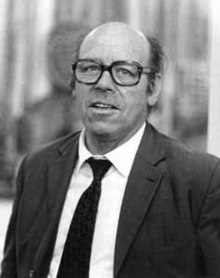Wolfgang Paul
Wolfgang Paul | |
|---|---|
 | |
| Born | August 10, 1913 |
| Died | December 7, 1993 (aged 80) |
| Nationality | Germany |
| Alma mater | Technical University of Munich Technical University of Berlin University of Göttingen |
| Known for | Ion traps |
| Awards | Nobel Prize in physics (1989) |
| Scientific career | |
| Fields | Physics |
| Institutions | University of Bonn |
| Doctoral advisor | Hans Kopfermann |
| Notes | |
Wolfgang Pauli humorously referred to him as his 'real part.' | |
Wolfgang Paul (August 10, 1913 – December 7, 1993) was a German physicist, who co-developed the non-magnetic quadrupole mass filter which laid the foundation for what we now call an ion trap. He shared one-half of the Nobel Prize in Physics in 1989 for this work with Hans Georg Dehmelt; the other half of the Prize in that year was awarded to Norman Foster Ramsey.
Wolfgang Paul was born on 10 August 1913 in Lorenzkirch, Germany. He grew up in Munich where his father was professor for pharmaceutic chemistry. After the first few years at the Technical University of Munich he changed to the Technical University of Berlin in 1934 where he finished his Diplom in 1937 at the group of Hans Geiger. He followed his doctorate advisor Hans Kopfermann to the University of Kiel and after being drafted to the airforce he finished his PhD in 1940 at the Technical University of Berlin. For several years he was private lecturer at the University of Göttingen with Hans Kopfermann. He became professor for Experimental Physics at the University of Bonn and stayed there from 1952 till 1993. For two years from 1965 until 1967 he was director of the Division of Nuclear Physics at CERN.
In 1957, Paul was a signatory of the Göttingen Manifesto, a declaration of 18 leading nuclear scientists of West Germany against arming the West German army with tactical nuclear weapons.
During World War II, he researched isotope separation, which is necessary to produce fissionable material for use in making nuclear weapons. His son Stephan Paul is a professor of experimental physics at the Technical University of Munich. His son Lorenz Paul is a professor of physics at the University of Wuppertal.
External links
References
- Paul W. (1990). "Electromagnetic Traps for Charged and Neutral Particles". Reviews of Modern Physics. 62 (3): 531–540. doi:10.1103/RevModPhys.62.531.
- Paul W., Steinwedel H. (1953). "Ein neues Massenspektrometer ohne Magnetfeld". Zeitschrift für Naturforschung A. 8 (7): 448–450.
